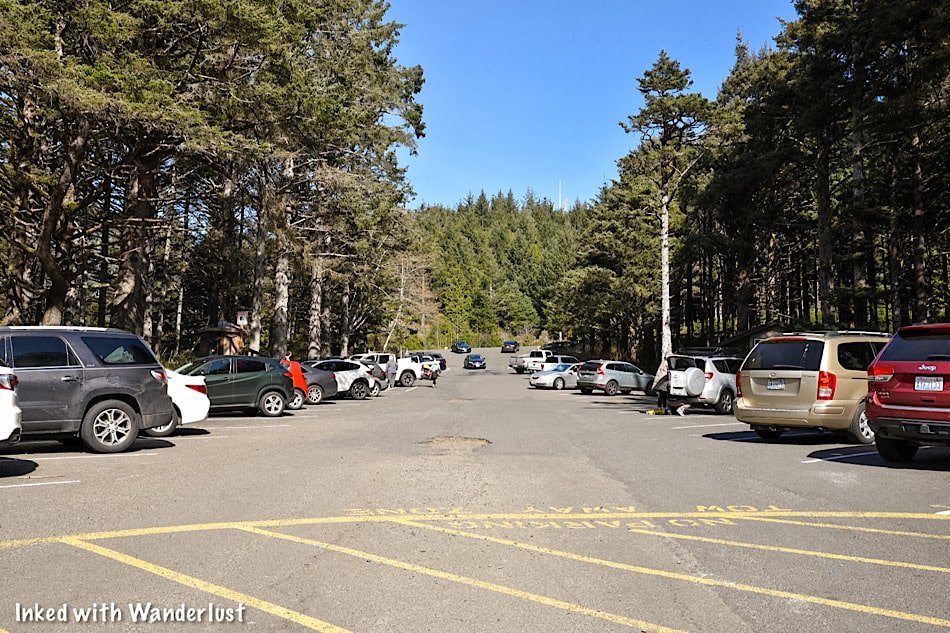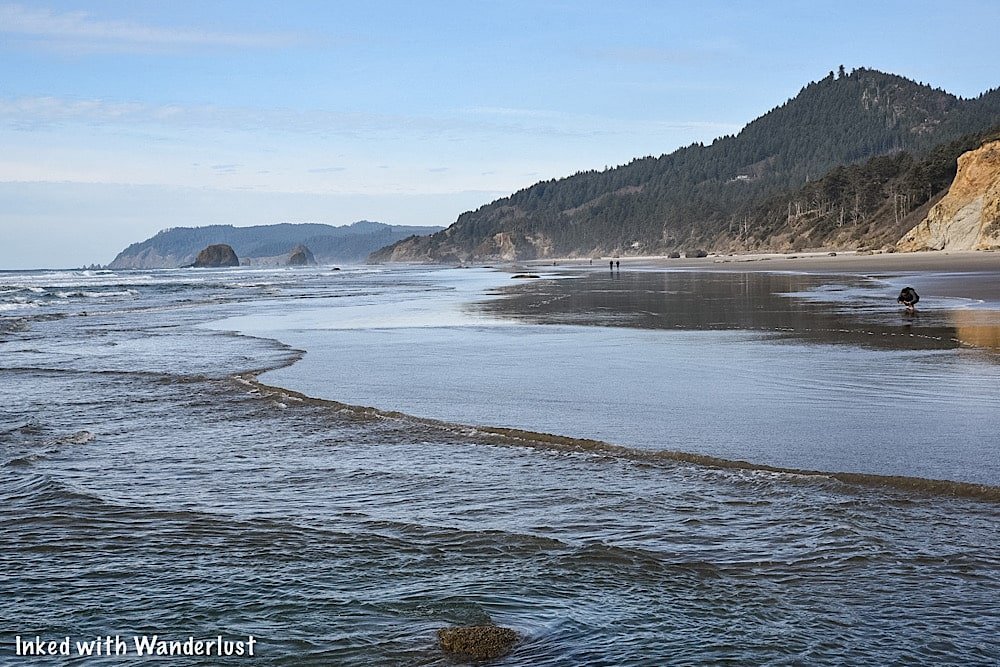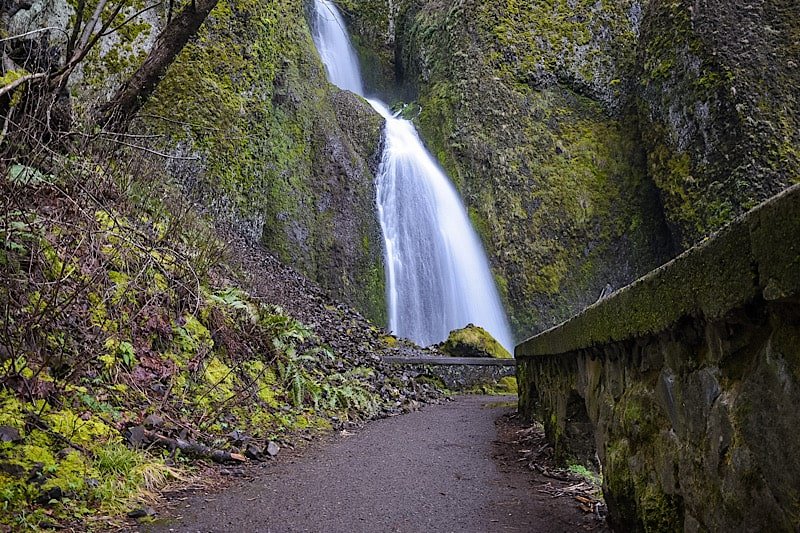Hug Point Waterfall and Sea Caves: How To Get There, Timing The Tide, and More
4 minute read | Contains affiliate links
Ever wanted to check out a waterfall that feeds directly into the ocean? If you’re near the beautiful coastal town of Canon Beach, you won’t have to look far.
Just four or five miles south on Highway 101 is Hug Point State Recreation Site. This gorgeous 43-acre stretch of Oregon coastline is not to be missed.
The site features the namesake waterfall, a bounty of sea caves carved into rugged sandstone, and jaw-dropping coastal views.
Many people come to Hug Point to see this rare phenomenon for themselves but as some find out, it isn’t as simple as just showing up. You need to know a couple things first.
Thankfully, seeing the waterfall and sea caves is easy as long as you know what you’re doing and are prepared. Things can go south rather quickly otherwise.
In this guide, we’ll provide you with all the necessary information you’ll need to ensure a successful visit (and remain safe at the same time). Let’s get into it!
Here’s some great beach gear we recommend…
Getting Here
The Hug Point waterfall can be found at Hug Point State Recreation Site, just five or so miles from the equally must-see attraction, Haystack Rock.
Getting here from other cities is simple as it’s located along Highway 101. Since it’s a popular spot, any GPS system would easily get you there.
If you’re staying in Portland, it’s an easy day trip. If you brought your own vehicle or can rent one, the drive from downtown to Hug Point is only 83-miles (one-way).
If you don’t have access to a vehicle, there’s a bus that provides twice-daily service from Portland to Canon Beach.
Something you should know, though, is the bus does not service Hug Point directly. It drops off near Haystack Rock’s public parking area in Canon Beach.
So you’ll either need to hitch-hike, walk from Haystack Rock to Hug Point on the beach, or try your luck with ride-sharing options.
Parking
There’s a narrow, but large parking lot at Hug Point that leads straight down to the beach. There are public restrooms and walkways on either side.
We were here in March and arrived at around 1pm. To our surprise, we had no issue getting a parking spot. If you’re here in the summer, though, plan to arrive early.
There were, “no parking”, signs all along the road outside the lot so if it’s full, you may have to circle around a few times until a spot opens up.
As you make your way to the stairs leading to the beach, keep an eye out for a lookout point on your right. There’s a small, short spur trail that’ll lead you to it.
This view gives you a great idea of how inaccessible Hug Point is during high tide; as you can easily see the wave lines up to the rocks.
Hug Point Tide Times
Before we get to the waterfall, we want to reiterate the importance of checking the tide before you go, as the waterfall is 100% inaccessible during high tide.
Timing low tide is important, but knowing when high tide comes back in is even more so. You do NOT want to get stuck out there.
To check tide times by specific dates, check this website. Be sure to bookmark it and check again before your visit.
Hug Point Waterfall
From the stairs leading to the beach, getting to the waterfall is simple and straight forward. Simply go north (right) from the stairs, towards the large sea cliff ahead.
You’ll go around the sea cliff at the point (the side closest to the water) and continue straight. As you get around it, you’ll see the waterfall about 200 yards out.
When Hug Point waterfall came into view, I was floored by the amazing scenery. Even though it wasn’t at peak flow (more on that later).
In case you’re wondering, yes, you can climb up to the top of the falls. There isn’t much to see and the rocks on the way up are slick, but you’re ok to go up.
Facing the beach from the top provides a unique perspective that most don’t see (most people look at the waterfall and move on).
Just know that at peak flow, it may be too dangerous to go up to the top. Just use common sense and you should be fine.
The beach in front of the waterfall makes for a great spot for a family picnic or recreating. During our visit people were flying kites, picnicing, etc.
Just around the way from the waterfall are a handful of caves carved into the limestone by waves over thousands of years.
Definitely check these out but as stated above, be mindful of high tide. Getting stuck in one of those caves wouldn’t end well.
The largest one we had found is at the back of the cliffs and has multi-colored patterns on the limestone. You can see, in great detail, the pattern of the waves in the rock.
When we got around to the other side, though, it was pitch black and the flashlight on our phones didn’t suffice. So bring a good flashlight if you wish to explore further.
To the left of the caves, you’ll see a shelf that literally “hugs” the cliffside. Take this to go to the other side to another beach and a beautiful enclave.
The shelf is covered with thousands of mussels and unfortunately, you can’t walk here without crushing at least a handful of them.
*Fun Fact: Early Oregon pioneers used this shelf to cross from one end of the beach to the other in stagecoaches.
At the end of the shelf, if you look out into the distance, you’ll see Haystack Rock. If you have the time, you could walk all the way to it from here.
As long as the tide remains low, you can explore all you want. When you’re done, simply head back in the same direction you came.
When To Go
If your main goal is to see the Hug Point waterfall at full flow, then you’ll want to visit in the winter or in very early spring after a healthy rain or snowfall.
When we visited in mid-March, it definitely wasn’t at peak flow. So November - February would probably be your best bet.
There isn’t much rain in the summer so obviously, the later into summer it is, the less flow there will be. Plus, summer is swarming with people.
If you just want to see it and don’t care about how heavy the flow is, then anytime is a good time, really. It just depends on your tolerance for crowds.
A Quick Note…
We’re often asked about the equipment we use to capture the photos on our website. Below, we’ve added Amazon links to those products and others that we recommend.
If you decide to purchase, Amazon will pay us a small commission. This helps us keep Inked with Wanderlust running and doesn’t cost you anything extra.
“Understanding Exposure” by Bryan Peterson (this book is a great resource for anyone starting out in photography)
It is our hope that this article was helpful to you in planning your next adventure. If so, please share it with your family and friends on Facebook or Pinterest.
You can further show support by subscribing to our newsletter below. In it, you’ll receive a once weekly newsletter containing announcements, new post alerts, news, and more!
If you have any questions, comments, or suggestions, please engage with us in the comment section below.
Thanks for reading and safe travels!

































